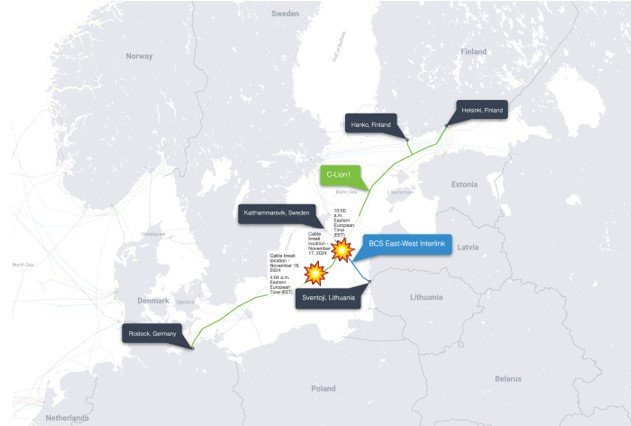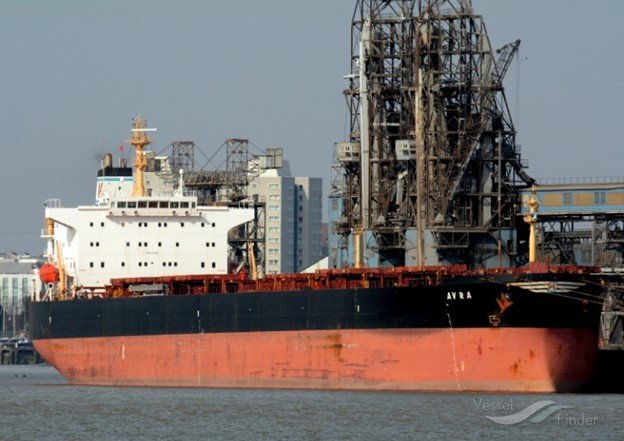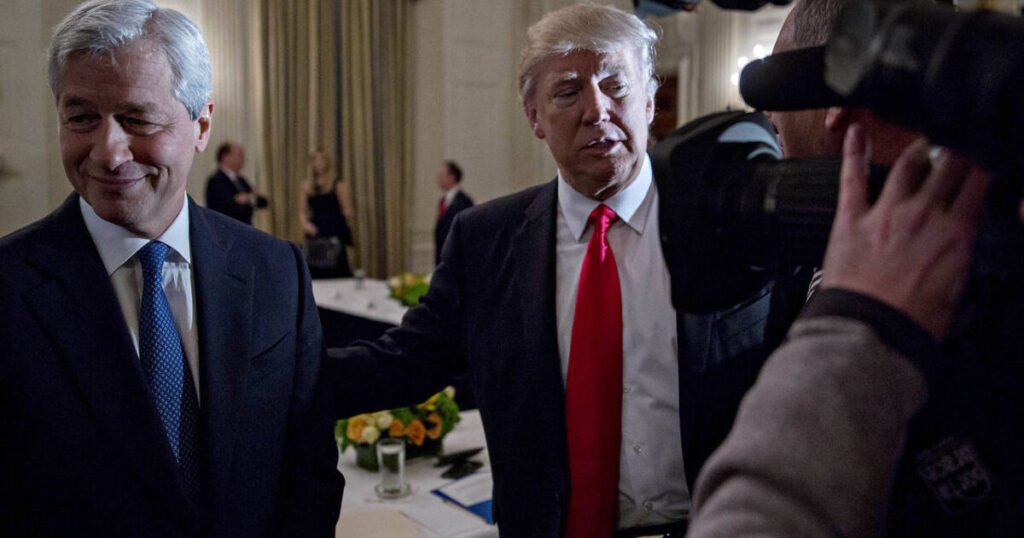By Unleashed News
By Guest Contributor Jason Sullivan at the Gateway Pundit | November 30, 2024

In a move that could have seismic implications for NATO’s strategic capabilities, two critical undersea communication cables in the Baltic Sea—lifelines of military coordination among NATO allies—were severed in what increasingly appears to be a calculated act of hybrid warfare. The timing of these incidents, coming mere hours after the Biden administration authorized Ukraine to use U.S.-supplied ATACMS long-range missiles against Russian targets, raises the unmistakable specter of a coordinated response by Russia, with China’s complicity, aimed at halting NATO’s ability to act decisively during a crucial moment in this escalating conflict.
The severing of these cables appears to be more than a mere act of sabotage. It may well represent a brilliant and calculated geopolitical move designed to delay NATO’s escalation until President Donald J. Trump, known for his aversion to endless wars and commitment to diplomacy, is sworn in as the 47th President of the United States on January 20, 2025.
A Timeline That Demands Attention
- November 16, 2024: The Biden administration authorizes Ukraine to employ long-range ATACMS missiles to strike Russian targets, marking a significant escalation in the U.S.’s involvement in the war.
- November 17, 2024: The first of two undersea cables, the BCS East-West Interlink connecting Lithuania and Sweden, is severed.
- November 18, 2024: The C-Lion1 cable, which links Finland and Germany, is also cut.
The proximity of these events is impossible to ignore. Within 48 hours of the Biden administration’s decision, NATO’s communication capabilities were significantly disrupted in a strategic region critical to European and global security.

Map by: TeleGeography. Notes by: Jason Sullivan
The Suspect: China’s Bulk Carrier Yi Peng 3
Enter the Chinese bulk carrier Yi Peng 3. Anchored suspiciously in international waters near the sites of both cable cuts, this vessel has been identified as a potential actor in the disruptions. Investigators suspect the ship’s massive anchor, potentially weighing several tons, was deliberately dragged across the seabed, ripping through these vital cables.
Despite Sweden’s urgent requests, the ship has remained anchored in place, with no indication that China will permit it to move into Swedish waters for inspection. Nor has any authority been allowed to board the vessel. This steadfast refusal to cooperate heightens suspicions of China’s involvement in what could be a coordinated act of sabotage in league with Russia.

A Strategic Disruption of NATO Coordination
The severing of the C-Lion1 and BCS East-West Interlink cables has left NATO temporarily reliant on slower and less secure backup systems, such as satellite communications. These cables are not mere civilian communication lines; they are the backbone of NATO’s real-time military coordination between its Nordic and Baltic allies. By severing these lines, Russia and China have potentially achieved several strategic objectives:
Preventing a Coordinated NATO Attack:
The ATACMS authorization opened the door for Ukraine to strike deeper into Russian territory with precision-guided missiles, a move that likely prompted Moscow to fear an immediate escalation. By disrupting NATO’s ability to coordinate long-range strikes and joint operations, Russia has effectively bought time to regroup and respond without the looming threat of synchronized NATO aggression.
Demonstrating NATO’s Vulnerability:
This act underscores NATO’s reliance on undersea infrastructure and its vulnerability to hybrid warfare. The inability to restore real-time communication quickly between key member states like Finland, Germany, Lithuania, and Sweden places NATO in a precarious position during this critical window.
Delaying Escalation Until January 2025:
With President Donald Trump poised to take office in less than two months, Russia and China may see this as an opportunity to stall NATO’s war machine. Trump’s track record of avoiding entanglements and seeking diplomatic solutions could mean a potential cooling of tensions in the new year—a stark contrast to the escalation strategy pursued under the Biden administration.
How Critical Were These Cables?
- C-Lion1 (Finland-Germany): A high-capacity line enabling secure communications and data transfer between Nordic countries and NATO’s central command in Germany. This cable is integral for military logistics and real-time decision-making.
- BCS East-West Interlink (Lithuania-Sweden): Provides vital connectivity between the Baltic states and NATO-aligned Sweden, crucial for regional security in a region bordering Russia.
The loss of these cables has effectively hampered NATO’s ability to synchronize responses, share intelligence, and execute operations in the Baltic Sea, a theater of immense strategic importance. For Russia, this creates a temporary but critical advantage.
The Deliberate Success of Hybrid Warfare
The methods used—deliberately dragging a multi-ton anchor across undersea cables—are both rudimentary and effective. Given the size of the anchor and the shallow waters of the Baltic Sea, the likelihood of completely severing these cables was extraordinarily high. This was not an act of chance; it was a calculated move designed to ensure maximum disruption.
Repair Timeline: A Strategic Delay
Repairing undersea cables of this importance is no small feat. Current estimates suggest that full restoration could take 6–8 weeks, pushing the completion date to late January 2025 or beyond. During this time, NATO’s ability to respond to any Russian aggression remains severely compromised, leaving member states vulnerable and divided.
This delay plays directly into the hands of Russia and China, giving them a critical window to consolidate their positions and deter further escalation.
Conclusion: A Masterstroke of Strategic Timing
The severing of these undersea cables appears to be a masterstroke of hybrid warfare, executed with precision timing and strategic intent. By crippling NATO’s communications and coordination capabilities in the Baltic Sea, Russia and China have forced the alliance to pause and consider its vulnerabilities. This move buys critical time for both nations—time to avoid further escalation until a Trump administration potentially reorients U.S. foreign policy toward diplomacy over war.
The Biden administration’s authorization of ATACMS strikes may have been the spark, but the severing of NATO’s critical infrastructure could very well be the fuse that prevents the flames from spreading further—at least for now.
For Russia and China, this is more than a tactical victory; it is a demonstration of how hybrid warfare can tilt the balance in a conflict where every second counts.

Source Links
- Submarine Cable Map – BCS East-West Interlink and C-Lion1
https://www.submarinecablemap.com/multiselect/submarine-cable?ids=bcs-east-west-interlink%2Cc-lion1 - VesselFinder – Real-Time Tracking of Yi Peng 3
https://www.vesselfinder.com/vessels/details/9224984 - Wikipedia: 2024 Baltic Sea Submarine Cable Disruptions
https://en.wikipedia.org/wiki/2024_Baltic_Sea_submarine_cable_disruptions - Wikipedia: C-Lion1
https://en.wikipedia.org/wiki/C-Lion1 - Wikipedia: BCS East-West Interlink
https://en.wikipedia.org/wiki/BCS_East-West_Interlink
The post BREAKING: Did Russia and China Sever NATO Cables to Block an Attack and Delay World War 3? appeared first on The Gateway Pundit.
Source: The Gateway Pundit
TruthPuke LLC hereby clarifies that the editors, in numerous instances, are not accountable for the origination of news posts. Furthermore, the expression of opinions within exclusives authored by TruthPuke Editors does not automatically reflect the viewpoints or convictions held by TruthPuke Management.







